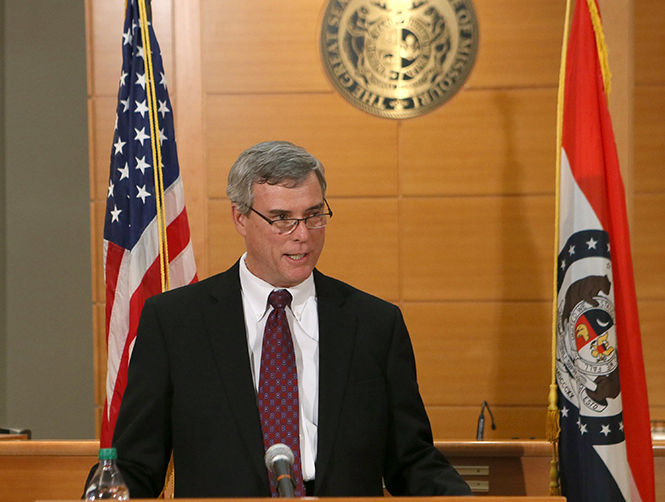Riots break out in Ferguson after grand jury announces long-awaited verdict
November 25, 2014
A grand jury decided Monday night the police officer who shot and killed an unarmed black teenager in Ferguson, Missouri, on Aug. 9 would not be indicted.
After two days of deliberation, Darren Wilson, a white police officer, would not be charged with 18-year-old Michael Brown’s murder, St. Louis County prosecutor Robert McCulloch said. Details about how the grand jury came to its decision were released immediately after his announcement.
Following the news, a crowd of protesters gathered in front of the Ferguson police station, smashing patrol cars’ windows, attempting to overturn them. Shortly afterward, officers in riot gear lobbed tear gas and flash-bangs into the aggressive crowd.
The National Guard had been called into Ferguson earlier that day in case of rioting. Michael Brown’s death has been characterized by protests, many of which turned violent. Heavily militarized force was used to subdue indignant crowds.
The tension in Ferguson can be summed up by three factors: the disenfranchisement of African Americans, the use of military force during the Ferguson protests and the length of Wilson’s trial, said Patrick Coy, the director of the Center for Applied Conflict Management and an expert in non-violent actions, human rights and U.S. Peace Movements.
“Their (black population’s) voice is not being heard in that area,” Coy said.
The police force and government in Ferguson are predominantly white, while the population of Ferguson is primarily black, creating disenfranchisement, almost like modern day Jim Crow laws, Coy said.
Brown’s murder became the catalyst that brought the bigger issue of racial tension to light, he said.
“When the police responds like that, with the use of military force, it will send a message that black lives don’t matter,” Coy said.
Kent State sociology Professor Jerry M. Lewis said he agrees the Michael Brown case showcases the general racial conflict in America.
“It is much more complex than a white police officer and a black teenager,” he said.
Fatigue played a factor in the riots in Ferguson Monday night, Lewis said. The more fatigued the population is, he said, the more likely there will be a loss of social control.
Matthew Thompson, president of Kent State’s Black United Students, said the decision left him at a loss for words.
“What this moment is teaching us is that the American system of justice is bullshit,” Thompson said. “I truly believe that by not indicting Darren Wilson, that America doesn’t care about black people.”
The grand jury’s decision seems impossible to explain, especially because Brown was unarmed and 25 feet away from the officer when he was shot, Thompson said.
“There is no way they call this justice and have people believe that,” he said.
President Obama addressed the nation after the decision and said he hopes Brown’s death leads to “incredible change, positive change.” He also urged the population to respond to the decision peacefully and constructively.
“We need to accept that this decision was the grand jury’s to make,” Obama said Monday night. “There are Americans who agree with it, and there are Americans who are deeply upset, even angry. It’s an understandable reaction. But I join Michael’s parents in asking anyone who protests this decision to do so peacefully.”
Contact Hannah Armenta at [email protected].

























